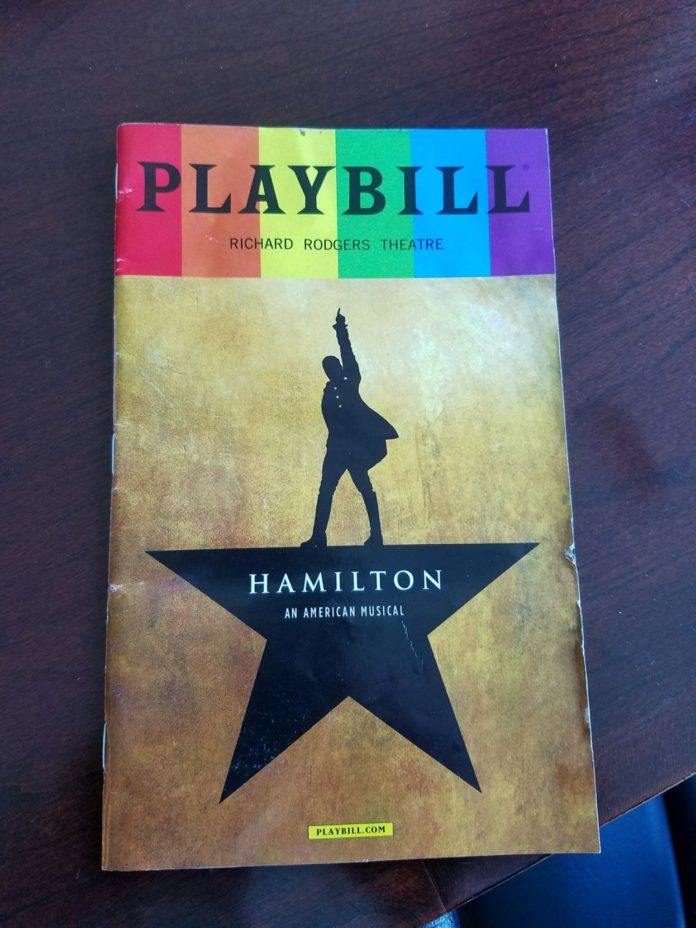I got to be there,
In the room where it happens
As Founding Fathers go, Alexander Hamilton is – was – a bit like the Marx Brothers’ Zeppo: vital to the plot, but totally unnecessary for the entertaining parts.
If you were ever assigned to read (i.e. trudge through) The Federalist Papers in high school, you might even have developed a loathing for the man who thought, “Why use one word when 25 will do?”
That was pre-Hamilton the musical. Now the often infuriating economist geek of the revolution has become the new darling of Broadway, the literary world and even the current political landscape. The original Treasury Secretary is proving he still has the swagger to make his mark or, as his character says in the play, “not throw away his shot.”
If you don’t know the man who stares to your left on the $10 bill, here’s a quick history. Hamilton was a bastard – in the term of his time – but a smart whippersnapper, born in the British West Indies. There he got to see the cruelties and inhumanity of slavery up close and personal. Orphaned by the death of his mother, he was eventually sent to King’s College, now Columbia University, in New York. The college closed during the American Revolution and Hamilton, as he says in the show, was “young, scrappy and hungry,” like his country, and headed out to fight. Being a smarty-pants got him waylaid as Gen. George Washington’s senior aide and he chafed at sitting at a desk. Given the chance for military service, he acquitted himself well at Yorktown, helping force the British surrender of an entire army, which virtually ended military operations in the war.
Hamilton then went on to become the nation’s first Treasury Secretary, helping set up a national currency and was a supporter of a strong national government. He was also an opponent of slavery and worked vigorously to make America a nation with a strong manufacturing base. Those last two items in particular drew opposition from members of other political factions, particularly those in the south, such as Thomas Jefferson.
Constantly opposing whatever side Arron Burr was on throughout his career, Hamilton was killed in a duel with the then-vice president and died when he was either 47 or 49, depending on what documents you believe.
I finally saw the Tony Award-winning show a few weeks ago on Broadway and came away impressed with the show and the man.
A sample of the lyrics from the show, Hamilton singing:
We are meant to be a colony that runs independently
Meanwhile, Britain keeps xhitting on us endlessly
Essentially, they tax us relentlessly
Then King George turns around, runs a spending spree
He ain’t never gonna set his descendants free
So there will be a revolution in this century
Enter me!
Presentation is everything and this is not – thank goodness – The Federalist Papers. The show on paper makes no sense. A rap-rock musical about our first Treasury Secretary? It should be a Saturday Night Live skit, not a production that makes you consider anew the American Revolution. But it does. Somehow the rapping cabinet meetings, the multicultural casting and the naked political chicanery work to tear down these angelic portraits of our founding fathers but at the same time make us take them seriously, warts and all human. Even the hero of our show, Hamilton, proves to have some seriously human qualities. That’s the kind of writing few historians can approach.
From one cabinet meeting in the show, from one Thomas Jefferson:
‘Life, liberty and the pursuit of happiness.’
We fought for these ideals; we shouldn’t settle for less
These are wise words, enterprising men quote ‘em
Don’t act surprised, you guys, cuz I wrote ‘em
I daresay most Americans don’t know how the nation’s capital became Washington, D.C., save for a couple of sentences in their 11th grade history book. As the musical deftly points out, it was a big time political trade-off between Hamilton, who wanted the states to pay off their Revolutionary war debts collectively, and Jefferson and James Madison, who felt the state of Virginia had already done its part. President Washington told the three to work it out and they did.
The event is immortalized in the song, Room Where it Happens:
No one really knows how the game is played
The art of the trade
How the sausage gets made
We just assume that it happens
But no one else is in
The room where it happens.
So that guy on your $10 bill, he didn’t really rap, rock or dance, but I feel like I know him a lot better when he does.






